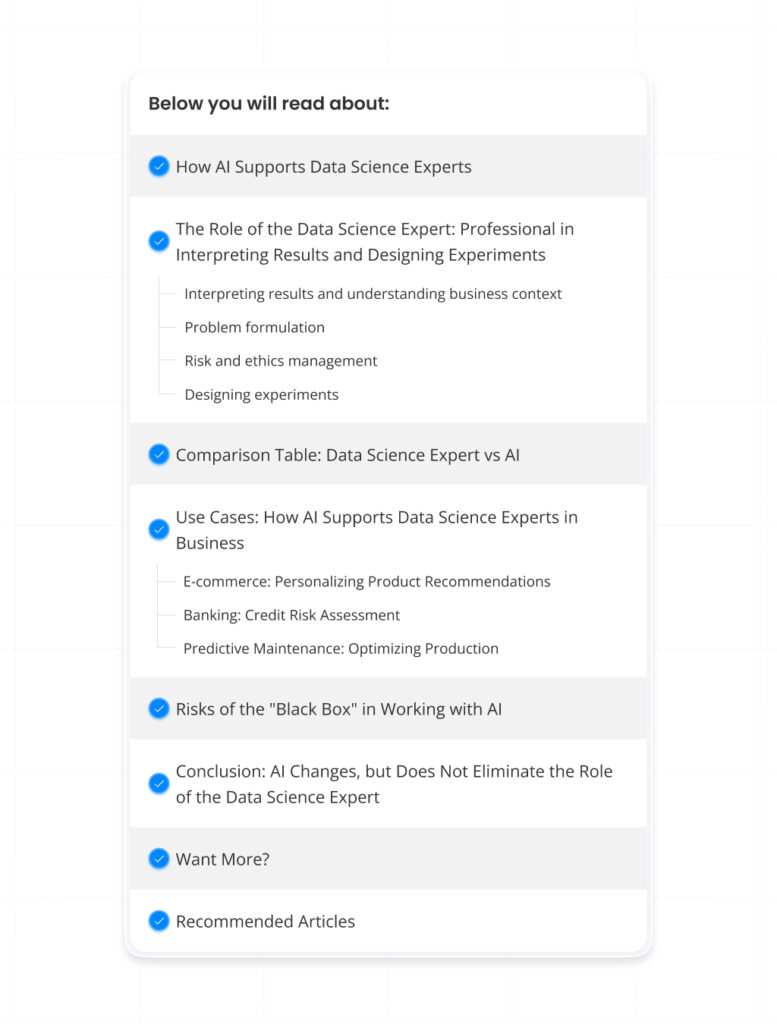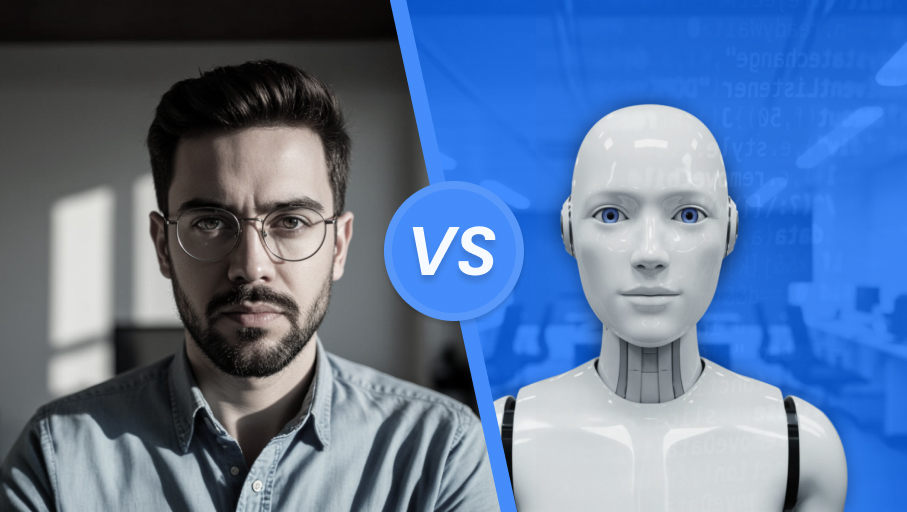In the era of digitalization and artificial intelligence, the role of Data Scientists is gaining importance. With the increasing popularity of AI tools, the question arises: does AI really accelerate analytical processes, or will it soon replace experts in this field? This article aims to clarify which tasks AI can take over and which still require the knowledge and experience of a Data Science professional.

How AI Supports Data Scientists in Their Work
Modern AI tools significantly assist Data Scientists in automating time-consuming and repetitive tasks. With the rise of AI Development and tools like AutoML, experts can focus on more strategic aspects of their work, while machines handle detailed data analysis. The application of AI accelerates processes such as:
- Data cleaning – removing unnecessary or erroneous data that may affect analysis results.
- Feature engineering – the automated creation of new variables that can improve a model’s performance. In practice, AI is particularly good at generating technical, mathematical transformations of existing data. However, the most meaningful and valuable features — the ones that come from understanding the industry context and the real business problem — still need to be designed by humans.
- Automated Model Optimization – AI enables the rapid testing of different algorithms, significantly shortening the time needed for model training.
LLM-powered Software Engineering also allows for the automation of code creation and testing, making development processes more efficient.
The Role of Data Scientists in Interpreting Results and Designing Experiments
Although AI is becoming increasingly advanced, it still cannot replace Data Scientists in interpreting results and designing experiments. There are several key areas in which the role of these experts remains irreplaceable:
- Interpreting results and understanding business context – AI can identify patterns in data, but it cannot evaluate whether these insights are meaningful within the company’s strategic and operational environment. Only Data Science professionals can judge if a pattern makes sense, assess its real-world implications, and ensure that conclusions are aligned with business goals.
- Problem formulation – AI cannot translate a high-level business objective (e.g., “increase retention”) into a concrete analytical problem (e.g., “predict churn within the next 7 days”). Defining the right question, scope, metrics, and constraints remains a critical human responsibility.
- Risk and ethics management – AI can produce highly accurate models that are nonetheless biased, unfair, or non-compliant with legal requirements (e.g., GDPR or anti-discrimination regulations). It is the expert’s role to audit models for bias, fairness, transparency, and regulatory compliance.
- Designing experiments – Formulating hypotheses and experiment methodologies requires creativity and expertise, as well as a deep understanding of the market.
Comparison Table: Data Science Expert vs AI
Task | Data Science Expert | AI / Automation Tools |
| Interpreting results | Essential for understanding business context | Can identify patterns but does not assess context |
| Preparing data | Creating advanced cleaning and transformation processes | Creating advanced cleaning and transformation processes Suggests transformations and simpler operations |
| Classic modeling | Selecting appropriate algorithms and adapting them to the problem | Performs automatic testing of multiple model combinations |
| Anomaly detection | Understanding which anomalies are important for the business | Quickly detecting anomalies on a large scale |
| Designing experiments | Designing tests and hypotheses in the business context | Lacks the ability to design experiments |
Use Cases: How AI Supports Data Science Experts in Business
1. E-commerce: Personalizing Product Recommendations
In the e-commerce industry, AI helps analyze user behavior and develop personalized recommendations. Data Scientists use AI tools to group customers and detect patterns in their behavior. However, the decision of which variables are crucial and how recommendations should be designed depends on the expert’s knowledge, considering business context, such as the seasonality of purchases.
2. Banking: Credit Risk Assessment
In banking, AI is used to analyze data related to clients’ credit history, enabling the assessment of credit risk. Data Scientists are responsible for designing models that consider economic variables and the risk of discrimination, ensuring compliance with legal regulations. AI helps in data processing, but humans oversee the ethical aspects of analysis.
3. Predictive Maintenance: Optimizing Production
AI allows predicting machine failures in factories, helping with maintenance planning. The Data Science expert designs experiments to accurately predict failures, considering variables such as machine age, usage intensity, and environmental conditions. AI supports quick anomaly detection, but humans verify if the conclusions are realistic.
Risks for Data Scientists When Working with AI “Black Box” Models
Although AI can significantly accelerate analytical processes, it comes with certain risks. AI models, especially those based on Deep Learning (DL), are often treated as “black boxes,” meaning their internal decision-making is difficult to interpret. A real risk is that the model may learn hidden, unethical patterns that influence its predictions—patterns that may remain undetected even during a thorough audit.
The Data Science expert plays a crucial role in verifying AI results and ensuring they align with actual business needs, as well as explaining decisions made by algorithms. Ensuring the explainability of results is especially important in the context of legal regulations, such as GDPR or audit requirements.
Conclusion: AI Changes, but Does Not Eliminate the Role of the Data Science Expert
Instead of replacing Data Scientists, AI enhances their capabilities by taking over routine tasks, allowing experts to focus on strategic and conceptual work. Automating processes such as data cleaning, anomaly detection, and model testing allows Data Scientists to save time and focus on more complex tasks, such as strategic modeling decisions, experimentation frameworks, and long-term business alignment. AI is a powerful tool, but the presence of an expert is necessary to ensure context, ethics, and decision quality.

Want More?
If your company is looking for an expert to help integrate AI into existing business processes, contact us. Our team of AI Consultants and AI Specialists offers comprehensive services in AI Development and integrating AI into Software Engineering. Leverage the potential of AI in your business and enhance it with world-class analytical solutions.
Recommended Articles:
- Working with Stermedia – AI Software Development Guide
This article presents how collaboration with Stermedia works in AI software development. It describes processes like data audits, discovery sprints, and AI project structures, showing how Data Scientists collaborate with the team in practice. - Navigating the Future of AI Software Development Outsourcing: Trends, Benefits, and Best Practices
This article discusses the future of AI software development outsourcing, highlighting its benefits and best practices. It’s valuable reading for IT leaders and managers responsible for data analytics and strategy, offering insights into effective AI implementation in organizations. - Tender Process Optimization with AI Solutions
This article demonstrates how AI can streamline tender processes by automating bid analysis and risk assessment. For companies dealing with tenders, it’s a practical example of how AI is applied in business operations.



